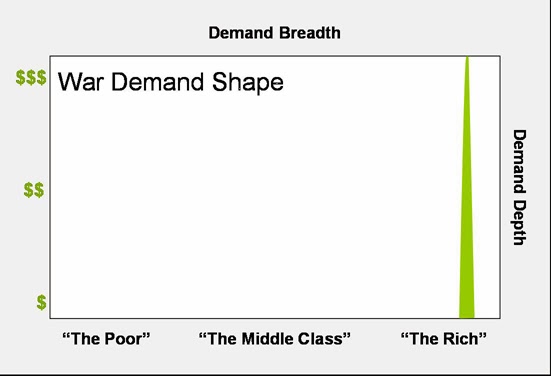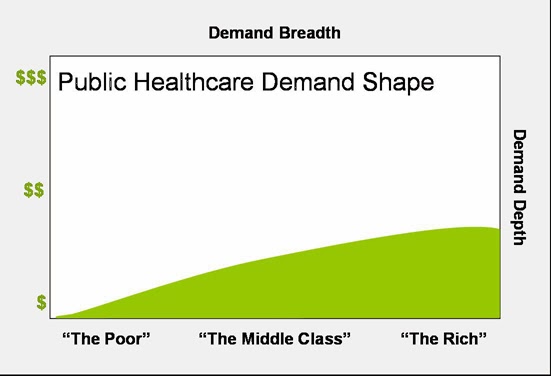Conscentia wrote:Xerographica wrote:Oh yeah, I did see that... but that was regarding a scenario where the money was not given to the content producers. Clearly there'd be less of an incentive for people to be honest with their valuations if they knew that Netflix would simply override/overrule them.
The money wouldn't necessarily be given to the content producers anyway - it would go to the people who own the IP. Netflix can't change that. Even if it did and even if we assume people didn't just lazily dump the fee into the first thing they see because they get to access everything anyway, money spent wouldn't necessarily reflect demand.
It feels like you're focusing on the word "demand" rather than on the "money spent" part. For me it's significant and meaningful and important and useful to know how much money people are willing to spend on things. It's convenient to use the word "demand" to refer to the amount of money that people are willing to spend on things. But we can also use the letter "X" or the word "fhqwhgads" or "zeitgeist" or any other combination of letters you want. I'm less interested in the word than in the concept. So it would be great if you focused on the concept.
Spending money is a sacrifice. The more money that is spent, the bigger the sacrifice. Since spending money is a sacrifice... generally people don't randomly spend their money. They didn't exchange their limited time and effort for money just so that they can flush it down the toilet.
It's easy to prove this... all I have to do is ask for your money. Of course you're going to want to know why you should give me any money. So in order to persuade you to give me your money, I'd have to provide you with some information. You'd compare the information that I gave you with all the information that you have and then decide whether or not to give me money. If you decided not to give me any money, well, in theory I could endeavor to provide you with different and better information. And again you'd compare this new information with all your information in order to decide whether to give me money.
This process of persuasion involves lots of brainpower being used and lots of information being shared, considered and compared. So it's significant and meaningful and important to know how much money individuals and groups of individuals are willing to spend.
Conscentia wrote:Distributing the fee to the content does not guarantee that more such content will be made. Fans of Star Trek TNG could regularly dump their whole fee into the show but it's not going to be renewed for another season regardless. The show has long been finished. Netflix isn't Patreon. The money doesn't go to fund content. As such there is no sense is spending the fee into order to voice demand, and I'd expect user behaviour to reflect this.
I was disappointed that Person of Interest was canceled...
As CBS’s chairman, president, and CEO Leslie Moonves told The Hollywood Reporter recently, the company “broke even” on Person of Interest last year, but because Warner Bros., not CBS, profits from the show’s back end (DVD sales, foreign rights, streaming, syndication), it was literally not worth it to renew the show. - Kate Aurthur, “Person Of Interest” And The Mysteries Of Cancellation
It was canceled despite the fact that nobody knew how much money that I was willing to spend on the show. And I suppose this could potentially sound egocentric. So let me zoom out. It was canceled despite the fact that nobody knew how much money that any subscribers were willing to spend on the show. This fact makes me acutely feel like I'm living in the stone ages. Where I have to go around trying to convince people that fire and wheels are useful. I'm extremely grateful that I live in an era where I don't have to try and convince anybody that fire and wheels are useful... but I'm also extremely disappointed that I live in an era where I do have to try and convince everybody that it's useful to know how much money people are willing to spend on things.
Consider how much better off your life is because you live in an era where everybody knows that fire and wheels are useful. Now double or triple or quadruple that amount of betterness to try and appreciate how much better off your life would be if you lived in an era where everybody knows that it's essential to know how much money people are willing to spend on things.
Admittedly I have absolutely no idea how much money everybody would be willing to spend on Person of Interest... so of course I can't guarantee that, if ignorance (of willingness to pay) had been eliminated, the show would have been continued rather than canceled. But I can guarantee that the deciders, whoever they were, would have made a far more informed decision.
The world will be infinitely better off when everybody makes far more informed decisions.
Conscentia wrote:No. That the one rich guy spent 6000 times more does not mean the demand is 6000 times greater. It just means he can afford to spend more. Even if he does want it more, so what? That one rich guy is still just one guy.
Let's imagine that people could choose where their taxes go. Some people want to go to war with Canada. The shape of the demand looks like this...
What would you say about the shape of the demand? I'd say that it's certainly tall enough... but it's way too skinny. Too few people are truly willing to pay for war with Canada. Sure, these few people are willing to pay a lot... but that really doesn't overrule the fact that there aren't nearly enough of them to justify this particular use of their tax dollars. So the DoD would use the money for other things besides invading Canada.
Using technical terms I'd say that the breadth of the demand is insufficient. The shape is too skinny. The fatter (wider) it is... the greater the justification for using those tax dollars to attack Canada.
In terms of the public sector, being concerned with the shape of the demand makes sense because the point of taxes really isn't to spend them on things that only a relatively few people are going to benefit from. We really don't want rich people to be able to spend their taxes on private golf courses or private yachts or private airports. We want everybody, rich or poor, to spend their taxes on things that lots of people are going to benefit from. Maybe like healthcare?
The shape isn't super tall... but it's pretty fat. There's definitely more than enough demand breadth to justify these tax dollars being spent on healthcare. Although perhaps it's not quite correct to compare something more general (healthcare) with something more specific (war with Canada). It would probably be more correct to compare war with Canada to cancer research. We can reasonably guess that the demand for the latter would be far broader than the demand for the former.
In any case, it certainly makes sense to consider the shape of the demand when we're talking about tax dollars. The thing is, we really weren't talking about tax dollars. We really weren't talking about the public sector. We were talking about donors to the Libertarian Party using their donations to signal the value of the potential convention themes. Yet, you definitely thought that the shape of demand was very relevant!
If the entire point of the public sector is to have a space where it's unacceptable for money to be spent on things that will only benefit a few people... then it's gotta be the case that the entire point of the private sector is to have a space where it is entirely acceptable for money to be spent on things that will only benefit a few people.
If one person alone wants to spend enough money to choose the theme for the Libertarian Party convention... then that's entirely acceptable. If one person alone wants to spend enough money to prevent Person of Interest from being canceled... then that's entirely awesome. If one person alone wanted to spend enough money to pay for the Statue of Liberty's pedestal... then that also would have been entirely awesome.
Conscentia wrote:Xerographica wrote:Thanks for sharing that video. I watched it... it's a great political video... but it didn't have a lick of economics. In economics gauging what people want is all about willingness to pay (WTP). It's not at all about what people say they want... it's all about how much money people are willing to spend on things. Because talk is cheap.
Willingness to pay reflects ability to pay, and as such is not a measure of demand. One cannot be willing to pay money one doesn't have, regardless of whether one wants something.
If somebody is completely broke then clearly we can't know how much money they'd be willing to spend on defense, healthcare, Person of Interest, the Statue of Liberty's pedestal, food, clothes, computers or anything else. Homeless people don't have much or any money... this is certainly true. But does this really mean that we can't know the demand for anything? Does it really mean that it's irrelevant how much money people are willing to spend on things? Markets should be entirely discarded and replaced with... voting? I'm sure that this is not what you're suggesting... yet you're bringing up ability to pay as if it would somehow only be relevant to donors to the Libertarian Party using their donations to signal the value of potential convention themes. Actually, the ability to pay (or the lack thereof) is relevant to all markets. So if you're arguing that it invalidates the spending info for one market... then your argument has to be applicable to all markets.
If we prevent people from using their money to help determine the value of things... then things will be incorrectly valued. When things are incorrectly valued, things will be incorrectly used. When things are incorrectly used, people will be worse off. Therefore, the degree and extent to which people are currently worse off... reflects the degree and extent to which we prevent people from using their money to help determine the value of things.
Right now you believe that the products at your grocery store are going to be correctly continued or discontinued because shoppers are allowed to use their money to help determine the value of the products.
Yet you also believe that the shows on Netflix are going to be correctly continued or canceled despite the fact that subscribers aren't allowed to use their money to help determine the value of the shows.
And of course you don't believe that Netflix can read the minds of its subscribers. Instead, you believe that subscribers already provide enough information for Netflix to make adequately informed decisions. But even Netflix acknowledges that ratings are less trustworthy than viewing habits. Except, how can viewing habits be more trustworthy than spending decisions? And it's not like Netflix can compare the two sets of information. It doesn't even see the point in having the information about spending. And there isn't a single subscriber who is interested in providing this information. Except for me. And one of my friends. I suppose there might be a few more people out there who would see the point of using their fees to inform Netflix. In any case we certainly aren't the rule.
The idea of using our money to inform each other sounds so simple and solid. We already do use our money to inform each other. We subscribe to Netflix. This informs everyone that we value Netflix's content more than we value the alternative uses of our money...
Netflix's content > alternative uses
We clearly and obviously empower Netflix to compete society's limited resources away from less valuable alternative uses. Yay!!!!!
There's one very basic premise here: we don't equally value Netflix and the alternatives. Except, this is just as true for Netflix's content! Nobody equally values Netflix's content.
If we could spend our fees on our favorite content, then this would inform Netflix that we value our favorite content more than we value the alternative uses of our fees...
favorite content > alternative content
We would clearly and obviously empower the producers of our favorite content to compete society's limited resources away from the producers of less valuable content. Yay!!!!!!!!! Yay?
People get excited about finding a $100 dollar bill on the sidewalk...and graduating... and getting engaged... and having a baby... and getting a promotion... and writing a bestseller... and winning the lottery. Yes, these things and many more are very reasonable justifications for excitement. But in the grand scheme of things.... all of these things are subordinate to empowering more beneficial producers to compete society's limited resources away from less beneficial producers. Therefore, nothing should excite us more than markets. We should be the most excited about markets because they facilitate the most excitement. If Netflix was a market... then we'd be able to use our fees to inform everyone how excited we are about our favorite shows. Netflix and other producers would be able to use this information to supply even more exciting shows. Yay!!!!!!!!!









